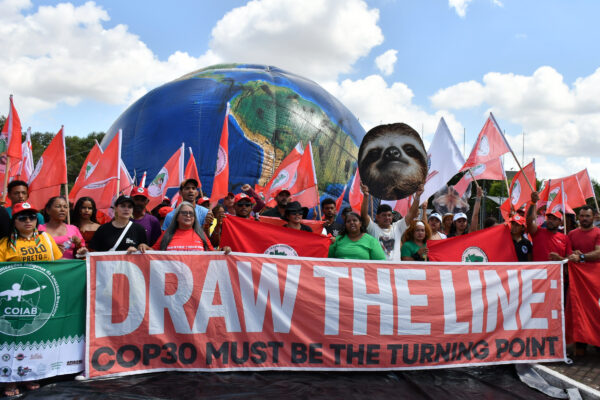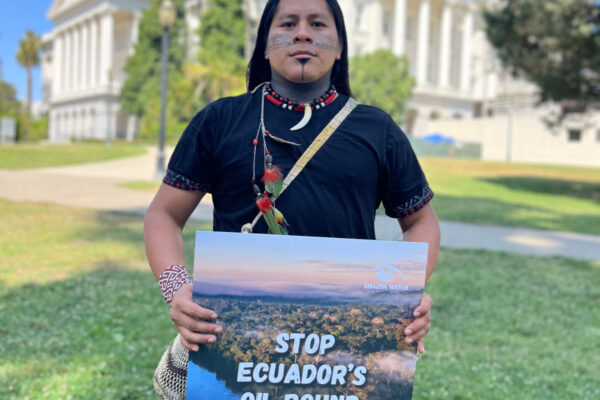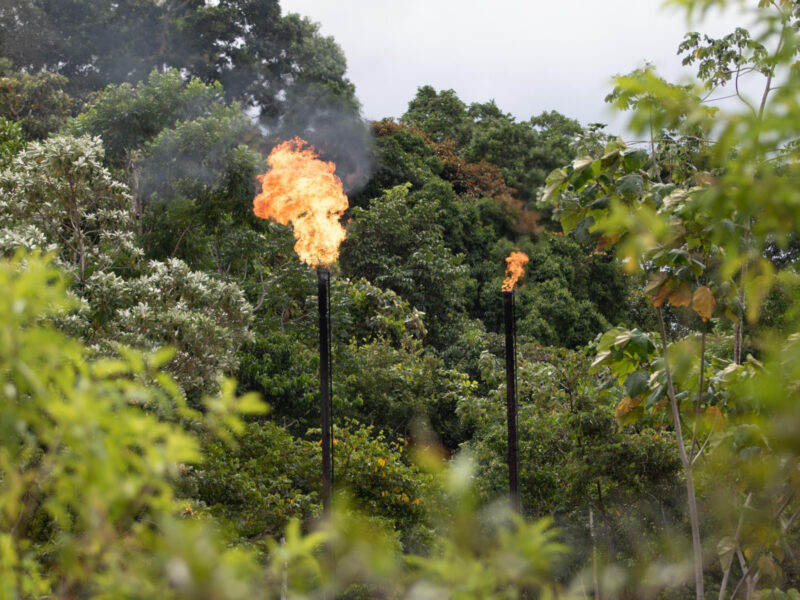Oakland, CA – Today, Amazon Watch (AW) released a response to a letter from Petroperú, a state-owned Peruvian oil company. Arguments in the letter attempt to contradict a recent AW blog on Vanguard’s financing of the oil company that points out Petroperú’s previous abuses in Indigenous communities, contribution to environmental degradation, and negative consequences of future operations to protect the company’s reputation.
Much of Petroperú’s new and ongoing projects are contingent on financing, primarily from big asset management firms and banks. To highlight this relationship, Amazon Watch released a brief blog post entitled, “Vanguard Funds Indigenous Rights Violations in Peru’s Amazon” to highlight the role of prominent financial institutions, like Vanguard, in financing Petroperú’s abuses on the ground through its bond investments.
In light of Vanguard’s role, leaders of the Achuar People of the Pastaza River and the Autonomous Territorial Government of the Wampis Nation, which will be harmed by Petroperú’s planned expansion in the Amazon rainforest, sent a letter to Vanguard executives on September 8th, 2022. They have yet to receive a response to their letter. Achuar and Wampis leaders plan to travel to the U.S. to meet with banks and asset managers about the harms and risks of their investments in Petroperú.
“Many of Petroperú’s financiers and investors have made lofty claims about their commitment to reduce emissions, fight climate change, and respect human rights. But pouring money into Petroperú flies in the face of all of these commitments,” said Moira Birss, Climate Finance Director at Amazon Watch. “These banks and asset managers need to put their money where their mouth is and stop investing in Petroperú and other companies that ignore Indigenous rights and drive climate chaos. Until then, their climate commitments are meaningless.”
Key takeaways from Petroperú’s letter and rebuttal
False Claim #1: Petroperú complied with international standards regarding consultation with impacted Indigenous communities.
Response: Petroperú’s claim relies on a faulty legal argument from Peru’s Ministry of Energy and Mines (MINEM). However, this opinion contradicts rulings from Peru’s Constitutional Court and findings from international legal bodies.
Additionally, Petroperú claims that Perupetro (the Peruvian licensing agency), allegedly complies with the international standards for prior consultation. Perupetro attempted to hold a face-to-face meeting with Achuar communities in February 2022 to introduce Petroperú as the new operator of Block 64, claiming that this “introduction” complies with the international standards regarding consultation. However, these mechanisms are not in compliance with international standards for prior consultation. As the Inter-American Commission states, the process of consultation with Indigenous communities, “is not a singular act, but a process of dialogue and negotiation that implies good faith.”
“For decades, oil companies have tried to drill in Block 64: an oil block created in our territory without due consultation or consent of our communities. For decades, we have rejected these companies, one after another,” wrote Nelton Yankur Antich, President of the Peruvian Federation of Achuar Nationalities, and Teófilo Kukush, Pamuk of the Wampis Nation, in a September 8, 2022 letter to Vanguard.
False Claim #2: Petroperú is not responsible for the vast number of oil spills from the North Peruvian Pipeline. Third parties are to blame.
Response: According to the Oxfam report The Shadow of Oil, “[t]he actual percentage of spills caused by pipe corrosion and operational failures in Amazonian oil blocks and the North-Peruvian Pipeline is 65.4%. Third parties are responsible for 28.8% of spills.” An investigation by the Peruvian Congress reinforced this finding, stating that Petroperú intentionally miscategorized oil spills caused by their own mismanagement of the pipeline as oil spills due to “theft of oil” to blame third parties and skew responsibility.
“From 2000 to 2019 more than 470 oil spills occurred in the Amazon, from which Petroperú is responsible for at least 94 of them. Just two weeks ago the North Peruvian Pipeline – administered by Petroperú – had two oil spills impacting communities in Morona and Cuninico. The usual tactic of Petroperú has been to blame third parties for these spills. However, the reality is that the North Peruvian Pipeline is old and corroded with very little maintenance. Indigenous communities are tired of the environmental impacts caused by the spills and for that reason are opposing oil drilling,” said Gisela Hurtado-Barboza, Advocacy Associate with Amazon Watch.
False Claim #3: Petroperú’s modernized refinery in Talara will “produce fuels friendly to the environment.”
Response: As per the latest Intergovernmental Panel on Climate Change (IPCC) report, expansion of fossil fuel infrastructure is incompatible with limiting global warming to 1.5 degrees Celsius. In fact, environmental harm from fossil fuel extraction adversely affects the biodiversity and health of communities living in neighboring areas.
“There are no fossil fuels friendly to the environment, and certainly not to Indigenous peoples in the Amazon whose lives and livelihoods would be irreparably harmed by the expansion of oil operations in their territories,” said Roshan Krishnan, Climate Finance Campaigner with Amazon Watch.
Petroperú has an egregious record in the Amazon and yet as recently as last week is continuing to express interest in starting operations in three oil blocks.
The Achuar People of the Pastaza River and the Autonomous Territorial Government of the Wampis Nation, continue to resist and mobilize against Petroperú’s attempts to operate in Block 64, which overlaps Indigenous territory. If the company is not held to account and continues to receive financing, it will undoubtedly reproduce similar harms from its North Peruvian Pipeline.
Complicity of financial institutions
A risk assessment published by Amazon Watch in September 2022 shows that Petroperú suffers from over-indebtedness due to bonds and loans. Furthermore, to operate Blocks 192 and 64, the company will need either a strategic partner with the capital or get more loans or bonds to operate those blocks. This information indicates that Petroperú will seek help from financial markets for more funding, particularly from previous banks that already financed Petroperú.













